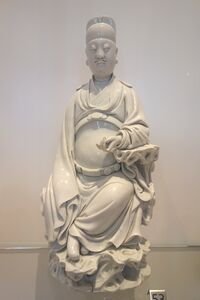تسايشن
| تسايشن | |||||||||||||||||||
|---|---|---|---|---|---|---|---|---|---|---|---|---|---|---|---|---|---|---|---|
| الصينية التقليدية | 財神 | ||||||||||||||||||
| الحروف المبسطة | 财神 | ||||||||||||||||||
| المعنى الحرفي | "إله الثروة" | ||||||||||||||||||
| |||||||||||||||||||
تسايشن (Caishen ؛ الصينية المبسطة: 财神; الصينية التقليدية: 財神; lit. 'إله الثروة') هو شخصية أسطورية تُعبَد في الديانة الشعبية الصينية و الطاوية. ويُعرَف مُجَسـَّداً في العديد من الشخصيات التاريخية، التي يُنظَر إليها كأشكال مُجسدة له، ومن بينهم ژاو گونگمينگ (趙公明, ويد-جايلز: Chao Kung-ming; also known as Zhao Gong Yuanshuai 趙公元帥 "Lord Zhao the Marshal")، Fan Li, and Bi Gan.[1] A large temple of Caishen has been built in the 2000s in Zhouzhi, Xi'an, Shaanxi.
Caishen's name is often invoked during the Chinese New Year celebrations.[1] He is often depicted riding a black tiger and holding a golden rod. He may also be depicted with an iron tool capable of turning stone and iron into gold.
التشخيصات التاريخية

Several versions of Caishen's incarnations' political affiliation and way of deification are circulated.[1] It is unclear whether they are genuine historical figures, though most of the stories agree that Caishen's most popular incarnation lived during the early Qin dynasty. Most probably it represents the merging of several heterogeneous legends, the one of Bi Gan being the most ancient.
Legend has it that Bi Gan had a wife with the surname Chen. His son was Quan (泉). After Bi Gan was put to death by his nephew King Zhou of Shang, Bi Gan's wife and son escaped into the woods. His death eventually marked the collapse of the Shang dynasty. Later on, Quan was honoured as the ancestor of all Lins by King Wu of Zhou.
Notwithstanding the above, there is another legendary character of the Chinese God of Wealth which is generally known as Caibo Xingjun (財帛星君) amongst Chinese communities. Li Guizu (李詭祖) was born in the Zichuan District in Shandong Province and held position as a country magistrate. Li Guizu contributed significantly to the district, whilst people built a temple to worship Li Guizu after his death. The late Li Guizu was then conferred the title Caibo Xingjun by the Wude Emperor of Tang dynasty.
التسايشن لكل الاتجاهات
| الرقم | الاتجاه | الاسم | اللقب |
|---|---|---|---|
| 1 | الوسط (中路財神) | Zhao Gong Ming (趙公明) | إله الثروة العسكرية (武財神) |
| 2 | الشرق (東路財神) | Xiao Sheng (蕭升) | إله جمع الكنوز (招寶天尊) |
| 3 | الغرب (西路財神) | Cao Bao (曹寶) | إله جمع النفائس (納珍天尊) |
| 4 | الشَمال (北路財神) | Yao Shao Si (姚少司) | إله الربح (利市仙官) |
| 5 | الجنوب (南路財神) | Chen Jiu Gong (陳九公) | إله جذب الثروة (招財使者) |
| 6 | الجنوب الشرقي (東南路財神) | Han Xin Ye (韓信爺) | إله القمار (大賭神) |
| 7 | الجنوب الغربي (西南路財神) | Liu Hai (劉海) | إله الحظ (偏財神) |
| 8 | الشمال الشرقي (東北路財神) | Shen Wanshan (沈萬山) | إله الذهب (金財神) |
| 9 | الشمال الغربي (西北路財神) | Tao Zhugong (陶朱公) | الإله المدني للثروة (文財神) |
وأحياناً يظهر تسايشن كـ إله الباب في المعابد الصينية و الطاوية، عادةً في شراكة مع الطاوي ذي المصباح المنير.
البوذية
Though Caishen is a Chinese folk deity, many Pure Land Buddhists venerate him as a buddha. In esoteric Buddhist schools he is identified as Jambhala.
الهامش
وصلات خارجية
 Media related to God of Wealth at Wikimedia Commons
Media related to God of Wealth at Wikimedia Commons